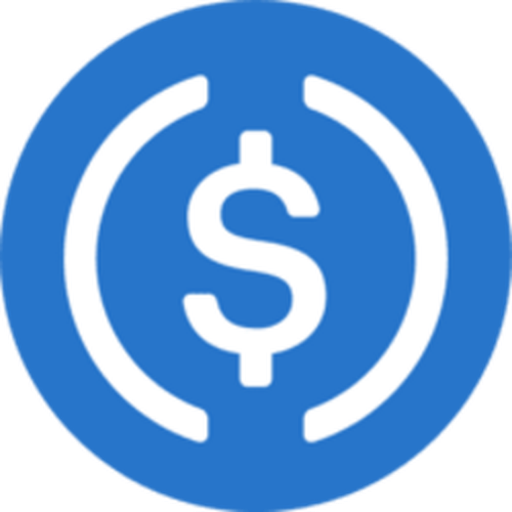USDC vs MX – Price, Market Cap & Performance Compared
Which coin performs better – USDC or MX?
We compare the current price (0.99971 $ vs 2.65 $), market cap (74 153 765 385 vs 247 773 759) and all-time high (1.17 vs 5.85).
Find out which one stands out right now!
USDC is currently trading at 0.99971 $, while MX stands at 2.65 $. These cryptocurrencies differ not only in price but also in market presence.
The market cap of USDC is around 74 153 765 385, and MX has about 247 773 759. Their respective all-time highs are 1.17 for USDC and 5.85 for MX.
Daily trading volume and the 24h price change (-0.00009 % vs -0.60630 %) also offer key insights.
Compare all metrics now and see which coin fits your investment strategy best!
USDC
USD Coin (USDC) is a stablecoin that is pegged to the US dollar, offering a consistent value and reducing the volatility often associated with cryptocurrencies. It provides a crucial bridge between traditional financial systems and digital currency markets, facilitating easy and secure transactions. USDC's foundation on blockchain technology ensures transparency and enhances trust among users and institutions.
more informationMX
MX is the native utility token of the MEXC Exchange, serving as the backbone for various activities within the platform's ecosystem. Primarily, it offers incentives such as reduced trading fees for users holding the token, along with participation in token sales and other exchange promotions. Community-driven features and a focus on user engagement make MX a central element in MEXC's strategy to enhance its competitive edge in the crypto market.
more information

|

|
|
|
|
General Information |
|
|---|---|
|
Title
USDC
|
Title
MX
|
|
Symbol
usdc
|
Symbol
mx
|
|
Whitepaper
-
|
Whitepaper
-
|
|
Website
|
Website
|
|
Community
-
|
Community
|
|
Last Updated
2025-09-24 23:29
|
Last Updated
2025-09-24 23:29
|
Price Data |
|
|---|---|
|
Current Price $
0.99971 $
|
Current Price $
2.65 $
|
|
High 24h
0.99972 $
|
High 24h
2.68 $
|
|
Low 24h
0.99960 $
|
Low 24h
2.61 $
|
|
Price Change 24h
0.00000 $
|
Price Change 24h
-0.01617 $
|
|
Price Change % 24h
-0.00009 %
|
Price Change % 24h
-0.60630 %
|
Market Data |
|
|---|---|
|
Market Cap
74 153 765 385
|
Market Cap
247 773 759
|
|
Total Volume
10 559 655 699
|
Total Volume
24 251 845
|
|
Market Cap Change 24h
159 815 467
|
Market Cap Change 24h
-2 018 685
|
|
Market Cap Change % 24h
0.21598 %
|
Market Cap Change % 24h
-0.80814 %
|
|
Return on Investment (ROI)
-
|
Return on Investment (ROI)
-
|
Supply and Availability |
|
|---|---|
|
Circulating Supply
74 175 659 818
|
Circulating Supply
93 475 334
|
|
Total Supply
74 172 355 958
|
Total Supply
413 787 834
|
|
Max Supply
-
|
Max Supply
-
|
Historical Data |
|
|---|---|
|
All Time High (ATH)
1.17
|
All Time High (ATH)
5.85
|
|
ATH Change %
-14.75232 %
|
ATH Change %
-54.70319 %
|
|
ATH Date
2019-05-08 00:40
|
ATH Date
2024-04-09 22:10
|
|
All Time Low (ATL)
0.87765
|
All Time Low (ATL)
0.04218
|
|
ATL Change %
13.90744 %
|
ATL Change %
6 186.55625 %
|
|
ATL Date
2023-03-11 08:02
|
ATL Date
2019-11-25 05:59
|
USDC
Understanding USDC: A Stablecoin in the Volatile Crypto World
USDC, or USD Coin, is a prominent stablecoin in the cryptocurrency market. Issued by Circle and backed by fully reserved assets, USDC is designed to maintain a 1:1 value ratio with the US Dollar, making it a reliable digital dollar. The stablecoin ecosystem plays a crucial role in the broader cryptocurrency industry by providing a less volatile alternative to traditional cryptocurrencies like Bitcoin and Ethereum.
The Evolution of USDC
Launched in 2018, USDC was developed as part of a collaboration between Circle and Coinbase, two major forces in the cryptocurrency space. Since its inception, USDC has seen significant growth and adoption, becoming one of the leading stablecoins alongside Tether (USDT) and Binance USD (BUSD). While its all-time high reached $1.17 in May 2019, this was more of an anomalous spike that reinforced the need for rigorous controls to maintain stability around its intended $1 peg.
Pros of Using USDC
One of the primary advantages of USDC is its transparency and regulatory compliance. Circle, the company behind USDC, undergoes regular audits and publishes monthly attestations of its reserves, ensuring users that each USDC token is truly backed by a dollar or dollar-equivalent asset held in reserve. This transparency fosters trust and helps mitigate the volatility that plagues much of the crypto market.
Furthermore, USDC serves as a bridge between traditional finance and the blockchain world. It's used widely in Defi applications, allowing decentralized lending, borrowing, and trading while maintaining value stability. Additionally, USDC's integration into various wallets and exchanges worldwide adds to its utility and liquidity.
Cons of USDC
Despite its advantages, USDC is not without its drawbacks. One of the critical concerns involves regulatory risks, as stricter regulations on stablecoins could impact its future operations. Also, as a centralized stablecoin, USDC is subject to censorship concerns, where accounts can be frozen, diverging from the decentralized ethos that underlies most cryptocurrencies.
Another drawback is that, unlike decentralized alternatives, USDC requires a level of trust in the issuer, Circle. Any potential mismanagement or economic instability affecting Circle could, in theory, impact its ability to maintain the 1:1 peg, a risk inherent to any centralized stablecoin.
Past Performance and Market Impact
USDC has generally maintained its peg effectively, with minor fluctuations typically remaining within a tight range around $1. Its stability has been pivotal during periods of crypto market volatility, where it serves as a safe haven for investors looking to escape market downturns without exiting the crypto ecosystem.
In terms of market cap, USDC has experienced exponential growth, driven by increased adoption in the decentralized finance (Defi) space and demand for stable trading pairs. Despite being eclipsed by Tether (USDT) in terms of market share, USDC's reputation for transparency gives it a competitive edge.
Future Outlook for USDC
Looking ahead, USDC's future appears promising but laden with challenges. The growing scrutiny from regulators worldwide could result in regulatory changes impacting its operations. However, Circle's proactive approach to compliance and regulation may shield USDC from adverse outcomes.
The stablecoin's role in facilitating seamless transactions and enabling innovative financial products in the Defi space will likely continue to drive its utility and adoption. Moreover, as traditional financial institutions begin to explore blockchain technology, USDC could play a critical role in bridging the two worlds.
In summary, USDC's stability, transparency, and integration with both traditional and decentralized finance systems position it as a key player in the ongoing evolution of digital finance. However, navigating regulatory landscapes and maintaining trust will be crucial for its sustained success.
MX
Exploring MX: A Comprehensive Look at Its Journey and Potential
MX, a cryptocurrency gaining prominence in the digital asset sphere, has captured the attention of investors and enthusiasts alike. Known for its utility and integration within the Max Exchange ecosystem, MX has witnessed a journey characterized by volatility, growth, and potential for innovation. In this article, we delve into the background of MX, its historical performance, and evaluate its future prospects while weighing the pros and cons of this intriguing cryptocurrency.
The Genesis and Evolution of MX
MX serves as the native token for the Max Exchange, facilitating various transactional operations within the platform. Since its introduction, MX has been adopted by users for trading fee discounts, governance rights, and as a medium of exchange within the exchange's ecosystem. The coin's trajectory from its all-time low in November 2019, priced at a mere $0.0422, to reaching peaks as high as $5.85 in April 2024, underscores its growth potential and investor interest.
Advantages of Investing in MX
One of the primary advantages of investing in MX lies in its strong utility within the Max Exchange. Users benefit from reduced trading fees and participation in governance decisions, enhancing the coin's intrinsic value. Moreover, MX has demonstrated significant market resilience, with a substantial percentage gain from its lowest market point. This historical growth can attract investors seeking coins with a track record of price appreciation.
Challenges and Considerations
Despite its bright prospects, investing in MX is not without its challenges. Market volatility is a significant concern, exemplified by MX's sharp declines from its all-time highs, like the near 48% drop from April 2024. Additionally, as with many cryptocurrencies, regulatory challenges could impact its value and utility. The competition within the cryptocurrency exchange industry also requires MX to continuously innovate to maintain its market position.
Historical Performance: A Witness to Volatility and Growth
MX has experienced fluctuations reflective of wider market trends in cryptocurrency. It has shown resilience through various market cycles, with its ability to climb from an all-time low to significant highs. The 7096.39% increase from its lowest market value speaks volumes about its potential upside, though recent months have seen a more measured performance with a 24-hour range between $3.01 and $3.08. The current price, as of the latest data update on October 24, 2024, stands at $3.04, marking a slight daily reduction of approximately 1.39%.
Future Outlook for MX
Looking to the future, MX is positioned within a landscape filled with potential considering its foundational role in a thriving exchange platform. Its future success will likely hinge on continued adoption, enhanced utility, and responsiveness to regulatory frameworks. Additionally, the performance of the broader cryptocurrency market and technological advancements within the Max Exchange ecosystem will serve as catalysts for MX's price trajectory and market standing.
In conclusion, MX presents a blend of opportunities and challenges for cryptocurrency investors. With its history of significant gains and fluctuations, it remains a coin of interest for those seeking to engage with active crypto ecosystems. Prospective investors should remain mindful of the volatility and market dynamics influencing its future performance.

